As a passionate performer and practitioner, Yemi Amodu has witnessed many eras, bridges, generations and has resourcefully contributed to the evolving landscape of filmmaking in Nigeria. With over four decades in Nollywood, Amodu has deftly traversed, crafted stories and successfully overseen productions that not only entertain but also educate, inspire, and contribute positively to the larger society. His rich tapestry in the art and business of filmmaking incorporates both theory and practical, making him a repository. He takes Ferdinand Ekechukwu through his artistic journey and experience of the film industry, such that reads like a historical primer, and brings his knowledge to bear as both a teacher and filmmaker. He shares his thoughts on the impact of streaming platforms in the Nollywood ecosystem, what he sees and considers his biggest threats to Nollywood and opportunities in the next decade. Excerpts
How did you first break into the Nollywood industry, and what were the factors that defined that era of filmmaking?
My journey into the Nollywood industry began long before the name “Nollywood” even existed. I was first trained in Alarinjo theatre by the late Bashiru Sokunbi of blessed memory. That traditional foundation shaped everything I became in the creative space. On July 12, 1983, while still in secondary school, I founded my own troupe called Christ Performing Troupe. Our first major play, ‘Alagba Jeremiah’, toured extensively across the South West and established my early reputation as a passionate performer and storyteller. In 1985, I won the award for Best Poet in a competition organised for all secondary schools in Ajele, Lagos Island. Around that time, during the Mass Mobilisation for Self-Reliance, Social Justice and Economic Recovery (MAMSER) campaign launched by the then military government, I was frequently invited to perform across Lagos State using Ewi (poetic performance) as a tool for social sensitisation. Those early performances gave me visibility and confidence, but like many young artists of that era, the financial rewards were minimal. After leaving secondary school, I took up employment at the Federal Palace Hotel as a Credit Control Clerk and later as a Front Office Cashier. Yet, my passion for film never waned. I began learning analogue editing alongside my job. Back then, the broadcast-standard equipment was U-Matic and Beta cam SP, which were quite expensive. In 1992, I co-produced my first film, Evil Rise (Idide Ibi), with Dotun Kolade, shot on Betacam SP, a significant feat at a time when most local productions were still done on VHS. That era marked a technological shift from analogue to digital cinematography and I was fortunate to be among the first few in Nigeria exposed to non-linear editing systems. I gained foundational experience using MX 30, Videonics, Amega 1200, and Amega 4000 suites. Later with the Super VHS and DV era, with systems like the DV9000 and Sony DSR models ranging from 150 to 570. Those innovations transformed post-production entirely, making editing faster, more accessible, and more creative. Looking back, those early years were defined by experimentation, passion, and resilience. We were building an industry from scratch — armed more with vision than resources — and that spirit continues to define the essence of Nollywood today.
You did mention Lagos, was it your birthplace?
I was actually born in Ibadan, but I spent my early years in Lagos, which played a significant role in shaping my artistic journey. Lagos exposed me to the vibrant energy, diversity, and creativity that continue to influence my storytelling today, while Ibadan remains a place of deep personal and cultural roots for me.
What was life like around the time in Lagos Island and how would you describe the cinema culture back then, considering that Lagos holds a place in Nigeria film and theatre history?
Lagos was truly a wonderful place to begin my career, and I remain proud of that foundation. The city played a major role in shaping me professionally because of the level of exposure and access to film equipment and creative opportunities I had at the time. It was a lively hub where passion for the arts met innovation, and that energy influenced everyone involved in filmmaking and theatre. The cinema culture back then was very vibrant and encouraging. If you produced a good film and took it to the National Theatre or any of the smaller, community-based cinema centres, you were almost guaranteed a strong audience turnout and good financial returns. People were genuinely excited about cinema; it was a major form of social engagement. During festivals, we would sometimes screen films all night until daybreak, and the atmosphere was electric. Even after we transitioned from celluloid to video, we still enjoyed solid returns because audiences were loyal and enthusiastic. Those years were truly special, a time when storytelling and community celebration went hand in hand, forming a rich part of Nigeria’s film and theatre history.
Can you tell us about your experience in the film industry with regards to a moment, or film that you feel changed the trajectory of your career?
The film that truly changed the trajectory of my career was ‘Afonja’, followed by ‘Owo Eje’. ‘Afonja’ holds a particularly emotional place in my journey because it marked both a painful and defining moment. I was originally positioned to direct the film, but due to the fact that I wasn’t yet a Theatre Arts graduate at the time, I was looked down upon and reassigned to work as a Digital Imaging Technician (DIT). My close friend, who had a theatre degree, was appointed as director over me. It was a deeply humbling experience; I wept bitterly that day and made a firm decision to return to school to study theatre properly. In the end, things turned around: I became the main director of ‘Afonja’ and also played the antagonist role of Alimi. That experience transformed my perspective on resilience, education, and destiny. It reminded me that setbacks can be divine redirections. The second defining project, ‘Owo Eje’, was an adaptation of a Yoruba literature text I had read for WAEC. It was both challenging and rewarding to bring that story to life on screen. The film became one of the most successful Yoruba adaptations and remains a reference point in the industry today. Both Afonja and Owo Eje were milestones that not only shaped my personal growth but also contributed significantly to the evolving landscape of the Nigerian film industry.
How would you describe the major phases or eras you’ve witnessed in Nollywood’s evolution?
The evolution of Nollywood has been quite progressive, and I’ve been blessed to witness its major phases. In the early years, our industry drew strength from the Alarinjo and stage theatre traditions, and then shifted into the home-video era of VHS and VCD where storytelling truly exploded across Nigeria and beyond. Later with the digital revolution, this improved our technical standards and professionalism. Today, Nollywood has become a global brand, one united industry where actors from English and indigenous films collaborate freely. We no longer grow by frivolity but by artistry and technical excellence. Producers now invest heavily in quality productions, and that’s why our films are gaining recognition worldwide.
What specific qualities do you look for in a script that tells you it has potential for commercial success and critical acclaim?
For me, what determines a script’s potential for both commercial success and critical acclaim lies in its content and structure. Every great story must have a clear set-up, conflict, and resolution — that’s the backbone of good storytelling. I believe in structuring creativity in an eclectic and captivating way that holds the audience from start to finish. Even when a script comes to me imperfect, I apply my director’s license to refine it — shaping the narrative flow, deepening the emotion, and making it spellbinding. But beyond structure, the real test is believability and relevance. How true does the story feel? How well does it reflect our society? Is it didactic, offering a message or lesson that endures? Those are the elements I look for. A story that resonates with truth, teaches something meaningful, and connects emotionally with people will always have the power to succeed — both commercially and artistically.
Has there been a time when you had to adapt your creative approach due to unexpected issues during production, such as a challenging location or a budget cut?
Of course, you can’t have a production go perfectly all the time. That’s why filmmaking always leaves room for improvisation and spontaneous decisions. There was a time we had completed our recce and approved all our shooting locations, but just a day before production, heavy rainfall destroyed our set. It was a natural setback that affected our schedule, budget, and logistics. In moments like that, you must think fast, adapt, and still deliver excellence. We had to redesign parts of the set and adjust scenes creatively without compromising the story. Situations like that remind me that a true filmmaker must be flexible; creativity doesn’t only happen on paper; it often comes alive under pressure.
How have you seen the audience’s taste in storytelling change over the decades, and how have you adapted your productions to meet those changes?
Over the decades, the audience’s taste in storytelling has changed significantly. In earlier years, our stories were often dominated by themes such as money rituals or armed robbery, which reflected certain societal concerns at the time. However, as these narratives became repetitive and began to clash with public sentiment, audiences started to reject such films. Today, our producers have become much wiser and more dynamic in developing stories. We now pay closer attention to our environment, drawing inspiration from the real issues and values within our communities. Most of us have also grown more conscious of our sociological responsibilities as filmmakers. We aim to create stories that not only entertain but also educate, inspire, and contribute positively to society.
What are your thoughts on the impact of streaming platforms on the Nollywood ecosystem?
The emergence of streaming platforms has truly redefined Nollywood, especially in terms of the technical, artistic, and storytelling quality of our productions. These platforms have raised the bar; pushing filmmakers to produce content that meets international standards while still maintaining our unique cultural identity. Streaming services like Netflix and Amazon Prime have not only given us access to a global audience but have also opened doors for collaborations and co-productions. Through them, Nollywood stories are now being watched in homes around the world, giving our filmmakers a new level of exposure and recognition. I remember visiting a friend in Dubai who wanted to entertain me with what he called a fantastic film. To my delight, he played one of my own films streaming on one of the major platforms. I was overjoyed. That moment reminded me how far we’ve come as an industry. Of course, getting a film accepted by these platforms can be quite challenging, it’s almost like carrying a camel through the eye of a needle. But once you succeed, your film is instantly taken to the world stage. It’s both a challenge and an incredible opportunity for Nollywood to continue growing in global relevance.
In earlier eras of Nollywood, what were the main challenges you faced in achieving professionalism and overcoming unsustainable practices?
In the earlier eras of Nollywood, one of the major challenges we faced was the lack of structure and coordination. The industry began as an open field, where there were no clear standards or regulatory frameworks to guide production. It was, in many ways, a free-for-all system. This unstructured environment made it difficult to maintain professionalism or ensure consistent quality across productions. Most of the early practitioners came from diverse backgrounds outside of filmmaking. Many were passionate but lacked formal training or technical grounding in film production. As a result, the market became flooded with low-quality films that, while popular, could not compete globally in terms of technical or artistic standards. A major turning point was the aftermath of the Structural Adjustment Program (SAP), which caused a steep rise in the dollar against the naira. This economic shift effectively killed off celluloid filmmaking, which had been our standard medium, as it became too expensive to sustain. To survive, we turned to videography, which, though more affordable, came with a noticeable drop in technical quality. Yet, that adaptation was also what kept Nollywood alive—it allowed the industry to continue producing, learning, and eventually evolving into the more professional ecosystem we see today.
What do you see as the biggest threats and opportunities for Nollywood in the next decade?
The biggest threat to Nollywood in the next decade remains distribution, which is our greatest weakness. It continues to impede our progress and has, in many ways, kept us from reaching our full potential. The truth is the current distribution structure in Nigeria is deeply flawed. Many of our distributors have now become producers themselves, which naturally creates a conflict of interest. How can we expect them to prioritise someone else’s film over their own? This has led to an unhealthy cycle where genuine filmmakers struggle to get their works properly showcased. Look at what’s happening in our cinemas today, the revenue-sharing formula between producers and exhibitors is discouraging. It makes the business side of filmmaking unattractive to investors and stifles growth. The basic economic principles of demand and supply, which should be the backbone of the film industry, have been ignored. As a result, our distribution network has become bottlenecked and unsustainable. However, within this challenge also lies a major opportunity. The rise of digital and alternative distribution platforms, from streaming services to independent online channels offer us a way to bypass traditional barriers. If we can establish a fair and transparent distribution system that leverages technology and respects both producers and audiences, Nollywood will not only expand its reach but also secure its financial future.
What key qualities do you expect in a director/producer, and how do you effectively manage creative differences with them?
The roles of a director and a producer are distinct but complementary. Directing is fundamentally a craft of interpretation. A director must be artistically sound and technically proficient, capable of translating a script into a compelling visual narrative. I look for directors who have a deep understanding of storytelling, camera language, pacing, and performance direction. Beyond skill, I value emotional intelligence, someone who can inspire the cast and crew, maintain discipline on set, and still allow creativity to flow freely. Producing, on the other hand, deals more with the administrative, logistical, and financial management of a production. A good producer must be organised, resourceful, and able to balance budgets without compromising the creative vision. They should have strong leadership and negotiation skills, ensuring that the project runs smoothly from pre-production to distribution. When creative differences arise and they often do, I approach them with open communication and mutual respect. Everyone comes to a project with their own perspective, but the goal should always be the success of the film, not individual ego. I believe in dialogue, in finding the middle ground where both creative and practical considerations meet. Ultimately, if the story benefits and the audience are satisfied, then we’ve succeeded together.
I would like to be remembered as one of those rare filmmakers who truly brought the town to meet the gown, someone who successfully bridged the gap between academia and the creative industry. My goal has always been to merge practical filmmaking with intellectual rigour, so that our industry is not just driven by passion, but also by knowledge, structure, and sustainability. That vision is what continues to drive me today. I am vying for the presidency of TAMPAN in 2026, because I believe it will give me the platform to make a meaningful impact to restructure the association, promote professional standards, and empower filmmakers with the right tools and education to thrive globally. My hope is that my legacy will be one of transformation and enlightenment, that people will say I helped liberate Nollywood from informal practices and guided it toward an ideal, well structured, knowledge-based industry. If I can achieve that, then I will have fulfilled my purpose as both a filmmaker and a teacher.
Pix: Yemi Amodu.jpg



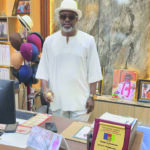


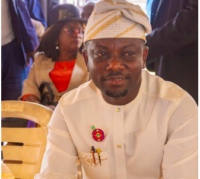

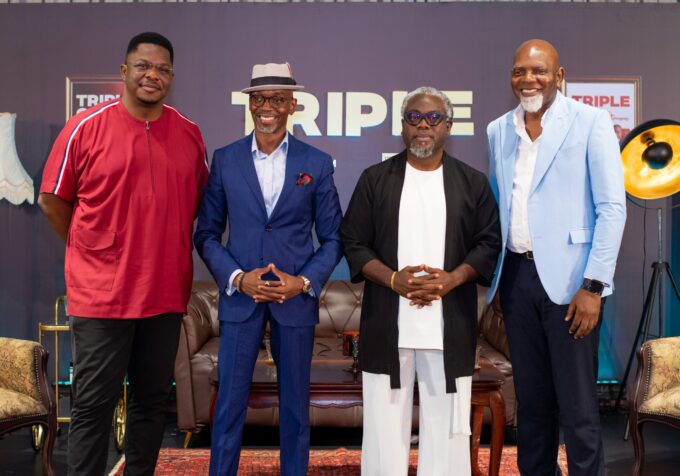
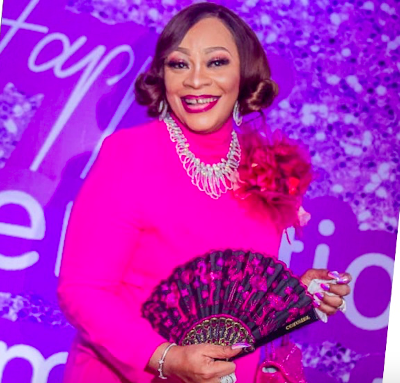
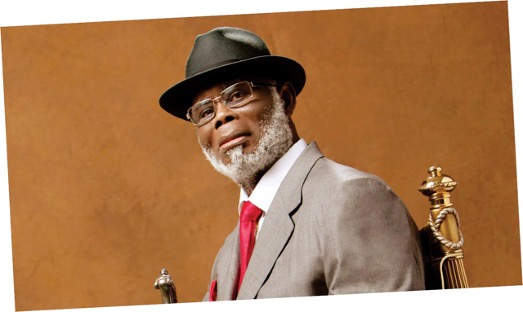
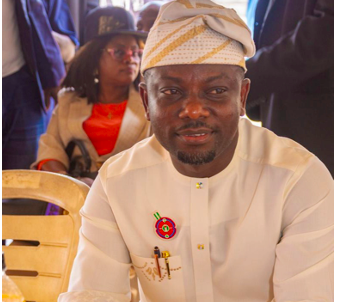





Leave a comment